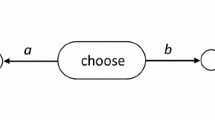Abstract
Using a specially designed cellular automaton capable of emulating completely the function of a human brain, we explore ways in which counterfactual sensitivity, that is, the ability of a computational system to respond to any valid inputs, relates to discrete-state machine consciousness. In this computational framework, the distinction between a computation and the recording of a computation can be blurred arbitrarily, yet the physical implementation of the computation itself is unchanged. From this, we conclude that a purely computational account of consciousness is unsatisfactory.

Similar content being viewed by others
Explore related subjects
Discover the latest articles, news and stories from top researchers in related subjects.Notes
Next output state is “on” if exactly three neighboring cells are on, unchanged if exactly two neighboring cells are on, otherwise “off.”
To remove any question of whether there are “extra” photons in the projected case, we can arrange things so that when projecting onto a unit cell, the total light is the same as the unprojected case, with either source individually brighter than the detection threshold. So when not projecting, each unit cell could output, say, 4 × the photons needed for detection by the neighbors, but when the projector is on, each unit cell could output only 2 × the threshold, with the projector also outputting 2 × the threshold, so that the total brightness is the same for both the projected and unprojected cases. It is also important to remember that the construction of the CA involves the use of a clock signal that indicates when each unit cell is to sample its inputs, and this signal changes only after both photon sources have fully mingled. This means that there can be no notion of which photons “really” indicated the state, since the laws of physics guarantee that all photons of the same wavelength are identical.
References
Maudlin T. Computation and consciousness. J Philos. 1989;86(8):407–32.
Bishop JM. A cognitive computation fallacy? Cognition, computations and panpsychism. Cogn Comput. 2009;1(3):221–33.
Bishop JM. Counterfactuals cannot count: a rejoinder to David Chalmers. Conscious Cogn. 2002;11(4):642–52.
Putnam HW. Representation and reality. Cambridge (MA): Bradford Books; 1991. 154 p.
Chalmers DJ. Response to articles on my work: Mark Bishop, counterfactuals cannot count [Internet]. Canberra: David Chalmers; [cited 2011 Jul 14]. Available from: http://consc.net/responses.html#bishop.
Sandberg A, Bostrom N. Whole brain emulation: a roadmap [Internet]. Oxford (UK): Future of Humanity Institute, Oxford University; 2008. Technical Report No.:2008-3. Available from http://www.fhi.ox.ac.uk/__data/assets/pdf_file/0019/3853/brain-emulation-roadmap-report.pdf.
Gardner M. Mathematical games: the fantastic combinations of John Conway’s new solitaire game “life”. Sci Am. 1970;223(4):120–3.
Berlekamp ER, Conway JH, Guy RK. Winning ways for your mathematical plays, vol. 2. New York: Academic Press; 1982. p. 472.
Chalmers DJ. Does a rock implement every finite-state automaton? Synthese. 1996;108:309–33.
Hardcastle VG. Conscious computations. Electron J Anal Philos [Internet]. 1993 Aug [cited 2008 Jul 23];1(4). Available from: http://ejap.louisiana.edu/EJAP/1993.august/hardcastle.html.
Chrisley R. Counterfactual computational vehicles of consciousness. Paper presented at: Tucson VII. 7th Biannual Toward a Science of Consciousness; 2006 Apr 4–8; Tucson, AZ, USA.
Marchal B. Mechanism and personal identity. In: De Glas M, Gabbay DM, editors. Proceedings of WOCFAI 91; 1991 Jul 1–5; Paris. [place unknown]: Angkor; c1991. p. 335–45.
Acknowledgments
Though I cannot say I am persuaded by his conclusions, (e.g., that all reality results from the operation of a universal computer whose mere Platonic existence implies a sort of modal realism), Marchal [12] discusses a thought experiment with projection onto a two-dimensional computer which was an important inspiration for some of the ideas in this paper.
Author information
Authors and Affiliations
Corresponding author
Rights and permissions
About this article
Cite this article
Muhlestein, M. Counterfactuals, Computation, and Consciousness. Cogn Comput 5, 99–105 (2013). https://doi.org/10.1007/s12559-012-9155-2
Received:
Accepted:
Published:
Issue Date:
DOI: https://doi.org/10.1007/s12559-012-9155-2




